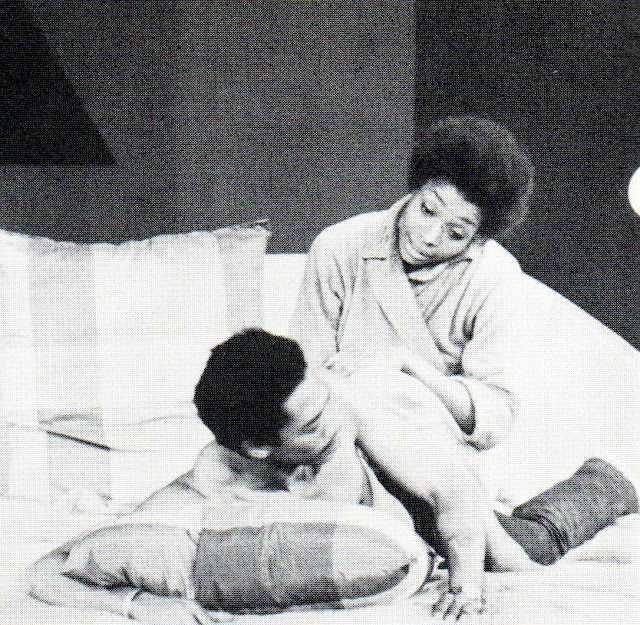 |
| Morgan Freeman, Beverly Todd. |
"In Lieu of Reviews"
For background on how this previously
unpublished series—introducing all mainstream New York shows between 1970 and
1975—came to be and its relationship to my three The Encyclopedia of the New York Stage volumes (covering every New
York play, musical, revue, and revival between 1920 and 1950), please check the
prefaces to any of the earlier entries beginning with the letter “A.” See the
list at the end of the current entry.
 |
| Gloria Foster, J.A. Preston. |
BLACK VISIONS [One-Acts] S: Ademola Olugebefola; C:
Grasanee Driskell; L: Ernest Baxter; CH: Hope Clark; P: New York Shakespeare
Festival; T: Public Theatre Annex (OB); 4/4/72-4/30/72 (64); “Sister Son/ji”
[Drama/Old Age/Politics/Race/Solo] A: Sonia Sanchez; D: Novella Nelson; “Players
Inn” [Drama/Barroom/Race] A: Neil Harris; D: Kris Kreiser; “Cop and Blow”
[Drama/Barroom/Crime/Drugs/Race] A: Neil Harris; D: Kris Kreiser; “Gettin’ It Together” [Drama/Romance/Sex]
A: Richard Wesley; D: Kris Kreiser
This evening of four one-acts by three black dramatists,
produced simply in workshop style, opened after a long period of previews and
postponements. Its first piece, “Sister Son/ji,” was a monologue in which
Gloria Foster adroitly played the role of an aged Mississippi woman. Sometime
after a black revolutionary uprising that cost the life of her young son, she recalls
the days of her youth as a Hunter College student, her involvement in the civil
rights movement, and the ultimate loss of her child in the resultant violence.
Foster’s virtuoso performance was considered stronger than the
play.
Two Neil Harris comedy-melodrama playlets followed, dealing with
underworld life in Harlem barrooms. They were episodic, naturalistic, and
witty. Flashy barflies, junkies, pushers, pimps, numbers runners, gamblers, and
crooked cops made up the dramatis personae of what were deemed interesting but
insufficient works.
In “Players Inn,” a college boy manages to get the better of the
superficially cool types around him. Critics were more impressed by “Cop and
Blow,” about a white cop (Norman Beim) who squeezes the saloon’s denizens for
money and is then kicked out by a black detective (Tucker Smallwood), who
proceeds to shake down the manager and barmaid (Juanita Clark) himself.
The strongest piece was Richard Wesley’s “Gettin’ It Together,”
concerned with “the black woman’s traditional complaint about having to
compromise and adjust to her man’s infidelities and beg for his interest,” as
Edith Oliver put it.
The finely acted piece examined the relationship of Loretta (Beverly Todd) and Nate (Morgan Freeman). He refuses to marry her and denies her
accusations about his having another woman. Though they are deeply in love,
they always quarrel and are then reconciled.
It was “written with quiet honesty . . . [and was] effective by virtue of its very sparseness,”
noted Harold Clurman.
The program as a whole was viewed as a
worthwhile but not overly impressive attempt to foster new black writing. Morgan Freeman and Gloria Foster, of course, later became major stars.
Previous entries:
Abelard and
Heloise
Absurd Person
Singular
AC/DC
“Acrobats”
and “Line”
The Advertisement/
All My Sons
All Over
All Over Town
All the Girls Came
Out to Play
Alpha Beta
L’Amante Anglais
Ambassador
American Gothics
Amphitryon
And Miss Reardon
Drinks a Little
And They Put
Handcuffs on the Flowers
And Whose Little
Boy Are You?
Anna K.
Anne of Green
Gables
Antigone
Antiques
Any Resemblance to Persons Living or Dead
Applause
Ari
As You Like It
Augusta
The
Au Pair Man
Baba Goya [Nourish the Beast]
The Ballad of Johnny Pot
Barbary Shore
The Bar that Never Closes
The Basic Training of Pavlo Hummel
The Beauty Part
The Beggar’s Opera
Behold! Cometh the Vanderkellens
Be Kind to People Week
Berlin to Broadway with Kurt Weill
Bette Midler’s Clams on a Half-Shell
Revue
Black Girl
Black Light Theatre of Prague
Black Picture Show
Black Sunlight
The Black Terror
